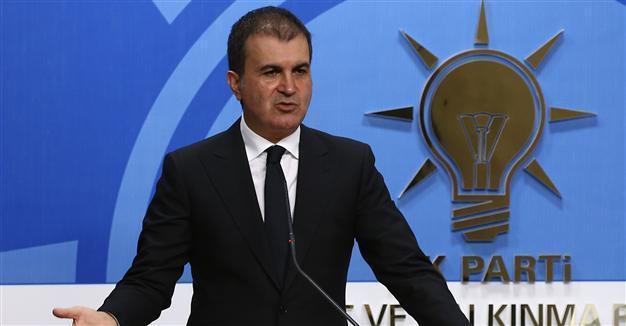AKP objects to EU’s wording on PKK, ‘resolution process’
ANKARA

Ömer Çelik, the spokesperson for the ruling Justice and Development Party (AKP). AA Photo
In initial remarks in response to a European Commission progress report which urged Turkey to re-launch a process aimed at ending the three-decade-long fight between security forces and militants of the outlawed Kurdistan Workers’ Party (PKK), the country’s ruling party has strictly refused the report’s wording on the issue, suggesting the EU has apparently been “influenced by the language used by circles close to the PKK.”
“There is a matter there which needs to be clarified in regards to literature,” Ömer Çelik, the spokesperson for the ruling Justice and Development Party (AKP), said late on Nov. 10, in response to questions over the report which was released earlier in the same day.
“There is a sentence saying ‘Ending the conflict environment.’ This is an exceptionally wrong phrase,” Çelik said at a press conference that was held while the AKP executives was still holding a meeting of the party’s highest decision-making body, the Central Decision and Executive Board (MKYK), as chaired by their leader, Prime Minister Ahmet Davutoğlu.
“’Conflict environment’ means a perception of civil war between two groups, two armed components, two paramilitary components, two terror organizations, gangs or tribes, an ethnic group and sectarian group with each other in some regions where legitimate state authority doesn’t exist. The main characteristic in these places is the absence of legitimate state authority. Unfortunately, here there is an exposure of political language used by the circles close to the PKK,” Çelik said.
“There is no conflict environment in Turkey. The name of the affair in Turkey is the ‘fight against terror,’” he said, arguing that those phrases which he rejected in Turkey’s case were convenient for describing the situation in places such as Syria since there was “no legitimate state authority” there anymore.
Violence between Turkish security forces and PKK militants reignited this summer after a suicide bombing attack against socialist activists in the border town of Suruç killed 33 people, shattering a fragile peace process, dubbed the “resolution process” by governmental officials, following a two-and-a-half-year de facto period of non-conflict. The bombing was blamed on the Islamic State of Iraq and the Levant (ISIL), but the PKK and many in the Turkish opposition blamed the AKP for creating the conditions to facilitate the attack.
Jailed PKK leader Abdullah Öcalan, who is serving a life sentence in İmralı Island prison, had played a central role in the government-led peace process aimed at ending the three-decade long conflict between Turkey’s security forces and PKK militants since at least late 2012.
Çelik also criticized the Kurdish problem-focused Peoples’ Democratic Party (HDP), a key player in the Kurdish political movement represented in parliament which was directly involved in the process, saying the HDP was acting as if they were the only ones who had the right to speak on behalf of Kurdish people in the country.
“At any stage, nobody should say ‘peace’ in a way which would show the state and the PKK as equal to each other while legitimate security forces have been launching operations against these elements which threaten the country’s territories and our democracy,” Çelik said.
